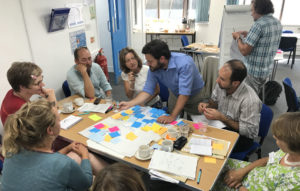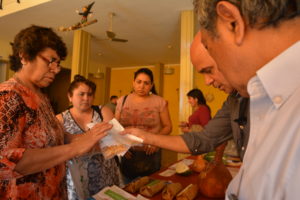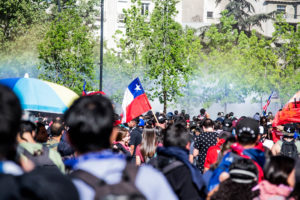For transformations to sustainability to be socially and ecologically just, they must derive from diverse, discursive processes embedded in specific political contexts and cultural conditions. Questions arise from this statement: what do such transformations look like? How and where do they happen; with whom and why?
The Transformations 2019 conference in Santiago, Chile, offered a great platform for reflection and discussion on these questions. The programme included a double session featuring researchers from the Pathways Transformative Knowledge Network (TKN): six cross-continental research hubs that shared a common aim to conduct transdisciplinary research addressing a sustainability challenge, defined in and by their local contexts. They explored how to work with local people on social transformations. At the conference, hub members reflected on what they have learned from these experiences.
The conference format was for seven-minute presentations, which invited many perspectives to bubble up. In the spirit of this, drawing from what I saw and heard at the Transformations conference during the Pathways sessions and elsewhere, I have put together a few reflections for researchers involved in or contemplating transformative research. This list is not exhaustive and surely there are other important considerations, not to mention practical factors, for this kind of work.
1. ADOPTING ROLES AND ‘WEARING HATS’

In transdisciplinary research, the design, implementation and interpretation of the research process is conducted in collaboration with stakeholders who possibly come from a mix of backgrounds, hold disparate views and are motivated by different interests. In this mode of research, the quality of these interactions is as important as the act of conducting the research.
As such, researchers might be required to take on a wide variety of roles and responsibilities according to the needs and skills of the broader research team. These roles are likely to evolve over time and there is a chance that a researcher will ‘wear multiple hats’ at once. Types of roles that I heard during the conference included activist, facilitator, repository, enabler, mediator and analyst.
The general view from the Pathways session was to resist the role of ‘expert’, but Adrian Ely (SPRU) shared from his experience in the Pathways UK case that there is sometimes a strong desire for researchers to tell the group what to do. Sometimes, the ‘expert hat’ can help gain crucial access to certain people and spaces that can move the work forwards. When deciding which roles and ‘hats’ may be required, all the hubs have considered the importance of reframing and reflexivity; navigating one’s relationship to oneself, the group and the systems with which everyone is engaged to transform.
Empathy was recognised as critical. For example, in the Pathways Mexico case, the focus had been on developing collective agency among disparate individuals and groups working in and around an urban wetland. The researchers were called upon to use their own empathy while cultivating and nurturing it in others. Elsewhere, depending on the sensitivity of the research environment and the dynamic of the group, transdisciplinary research might require researchers to offer some form of pastoral care to keep a project on track. During the Pathways session discussion, a point was raised that if researchers find they do not hold the skills or have the time needed to deal with a situation, provisions should be in place to offer help outside the core research group.
2. Building aligned or non-aligned groups

Often, researchers can initiate bridges between otherwise disparate groups. Depending on the research objective, researchers leading a project may have a decision to make over the cognitive and/or political alignment of the research group.
Some teams in the Pathways project had decisions to make in this regard. In Argentina, as Anabel Marin (CENIT) explained, researchers had assumed the roles of activists in a country and sector (agricultural) that was familiar with anarchism. They began by assembling a group whose interests and motivations were broad, but when meetings became embroiled with arguments, they decided to change tactics and ‘push’ an aligned group of stakeholders into developing the Bioleft initiative.
In China, the intention was to assemble a group that was, in some regards, radically non-aligned, including laid-off workers, former plant owners, local government officials and NGOs. It is conceivable that this was the first time they had all sat in a room together. For the research team, this was new and has opened up opportunities for people to be acquainted and understand one another’s points of view.
As a project develops, the alignment of a group could be expected to shift. Tracing how these alignments developed was important to the Pathways project.
3. Considering dynamics of power
Once a group has been assembled, what are the dynamics that occur between people? Even a group whose interests appear to be aligned will be subject to sticky power dynamics. These can feel intractable in almost any context. By maintaining a sensitivity to this, researchers might be able to respond and intervene in a practical and positive way.
Pravin Kushwaha from the Pathways India team gave an example of a Wastepicker’s Conference to which the team was invited to participate. Speakers were lined up from across India, including policymakers, researchers and wastepickers. The Pathways researchers are aware of the dynamic that occurs when groups that are marginalised by mainstream policy processes are invited to add their views after policy professionals have given theirs. The team insisted that the wastepickers speak first. This shifted the dynamic in the room. As a result, the policy professionals framed their presentations in relation to the concerns of the wastepickers, rather than referring to technologies, management or policies.
4. Logics for co-producing knowledge
Paddy Van Zwanenberg (CENIT), from the Argentina team, drew attention to the notion of co-production, central to sustainability science and transdisciplinary research. The idea has developed from different literatures which hold various ideas on ‘why co-production?’, with whom and for what purposes.
Two logics developed from this literature. An ‘instrumental’ logic is concerned with enhancing the relevance and usability of knowledge by involving users of the research in the process. Sometimes there is a tendency to focus on working with users who are already familiar with research, such as decision makers, policymakers and funders. The research ideas and agendas can become coupled easily with mainstream conceptions or framings.
‘Empowering’ logic is concerned with knowledge politics, recognising that there are a plurality of ways of thinking about sustainability challenges because people hold diverse values and lived experiences. Researchers adopting this logic try to make choices informed by such plurality, typically involving users or people who are marginal to mainstream decision-making processes. They may uncover views and issues that conflict with the mainstream, but it can be harder to turn these into practice, as such issues may have no existing institutional support.
Both logics mean different things for researchers doing co-production. Paddy’s question at the conference was ‘can empowering logics also be instrumental?’ The Pathways teams have used tactics and strategies to try and reconcile them in a productive way.
5. Is there a continuation or an ‘exit’ strategy?
Financing the long-term engagement required of transdisciplinary research projects is an issue for all the Pathways teams. Fundamental relationships have been established and, in the case of India and Argentina, new institutions have formed with social momentum behind them. For these to continue and thrive, some form of continuity is necessary. However, without sustained financial income, this is a serious challenge.
While the India hub has secured funding for discrete initiatives developed out of the project, this does not help with overall sustainability. Most transdisciplinary research projects will benefit from either a sound business plan (for the Argentina case, developing Bioleft as a social enterprise) or a defined ‘exit strategy’. The latter might allow the project researchers to step back but leave a door open (as in the UK case, where a repository of information is prepared for anyone seeking to advocate agroecological farming approaches on the Downsland Estate in Brighton and Hove). One thought in Santiago was that different donors could collaborate to offer ‘exit strategy’ support funds, allowing the continuation of these projects according to the needs that have emerged.
6. Engaging with political resistance movements and processes

Mariana Walter (Autonomous University of Barcelona and the ACKNOWL-EJ TKN), gave a plenary at the conference in which she reflected on the role of researchers in relation to social movements: academics follow where social movements lead. Researchers in the ACKNOWL-EJ project have operated on this logic, orienting their work towards engaging with and responding to ongoing political and ecological urgencies, and supporting social movements. Their Conflict and Alternatives Transformations Frameworks are designed to help learn from conflict transformation practices that have been brought about by resistance movements. The EJ Atlas illustrates the ways in which social movements can be defined locally and connected globally.
Down the road from the conference, demonstrations were happening: protests about the rise of Metro fees, underpinned by over entrenched inequalities in Chile. By the end of the conference, these bubbling protests had boiled over, resulting in the national government declaring a state of emergency. In the same week, huge protests rose in Lebanon over the country’s economic concerns, and protestors clashed with Spanish police in Catalonia over the region’s ongoing fight for independence from Spain. Elsewhere, US troops withdrew from the Kurdish-controlled areas of northeastern Syria – known as Rojava – and Turkey began a long-threatened assault on Kurdish centres.
The world over, exclusionary politics are generating deepening inequalities, climate chaos and social division, all of which have profound consequences for social transformations. Beyond the walls of governments and academies, forms of resistance are rising and alternatives being built. Social justice must be the backbone of the environmental movement, while engaging with and learning from social struggles and resistance movements should be integral to transformative sustainability research. How to do this is something that requires continued reflection and action. Sadly, few presentations at Transformations 2019 mentioned the imperative for research that centres this kind of work. Perhaps this is something that the organisers could take on board, and look to examples such as the 2018 ERPI conference, or the biannual POLLEN conferences.
read more
Find out more about the Pathways TKN and download a guide to using T-Labs on the Pathways page of the STEPS website.
